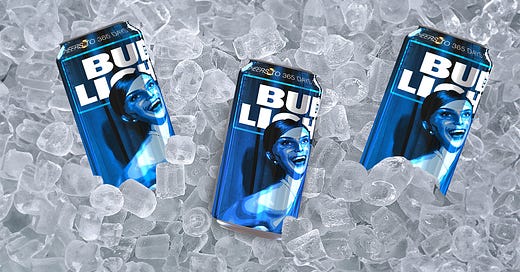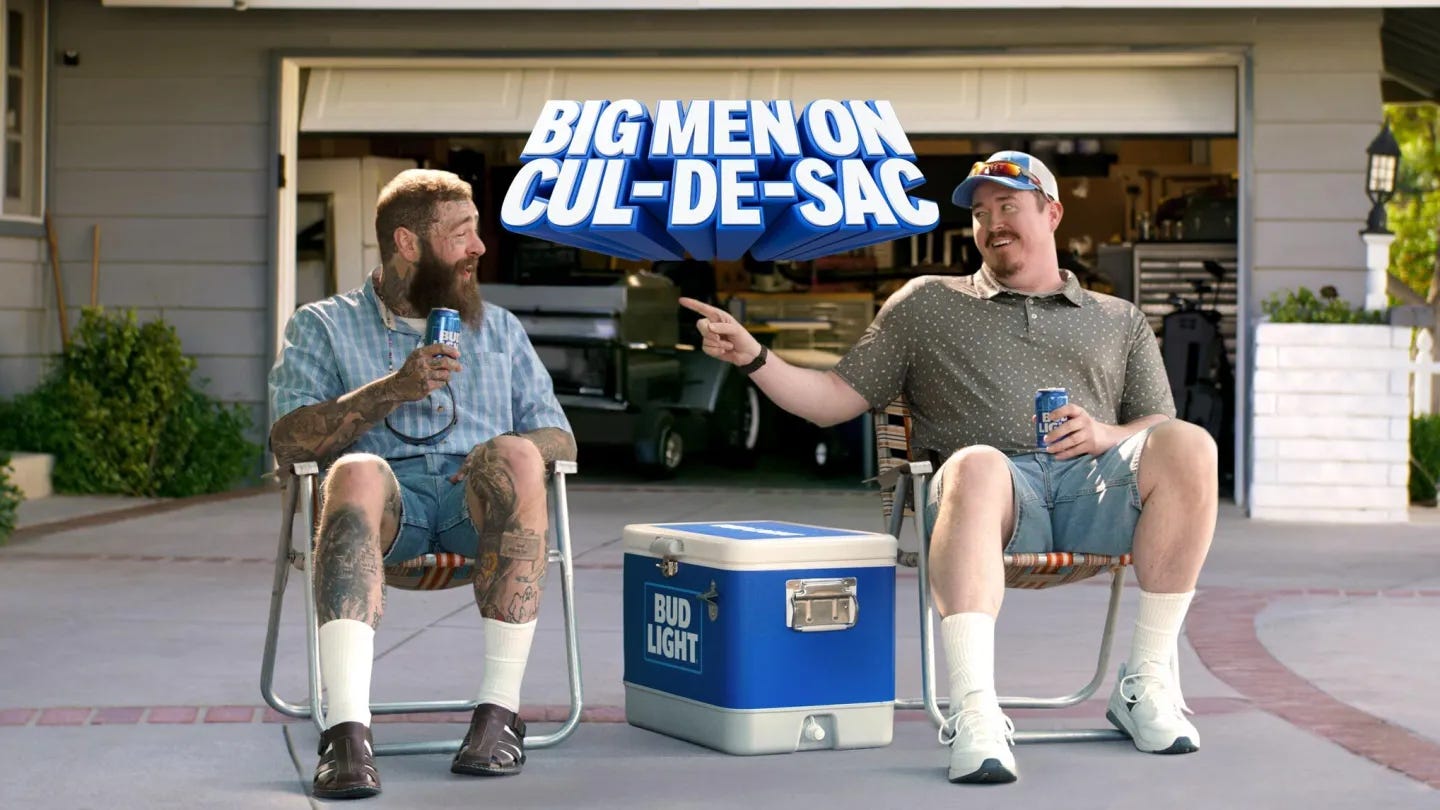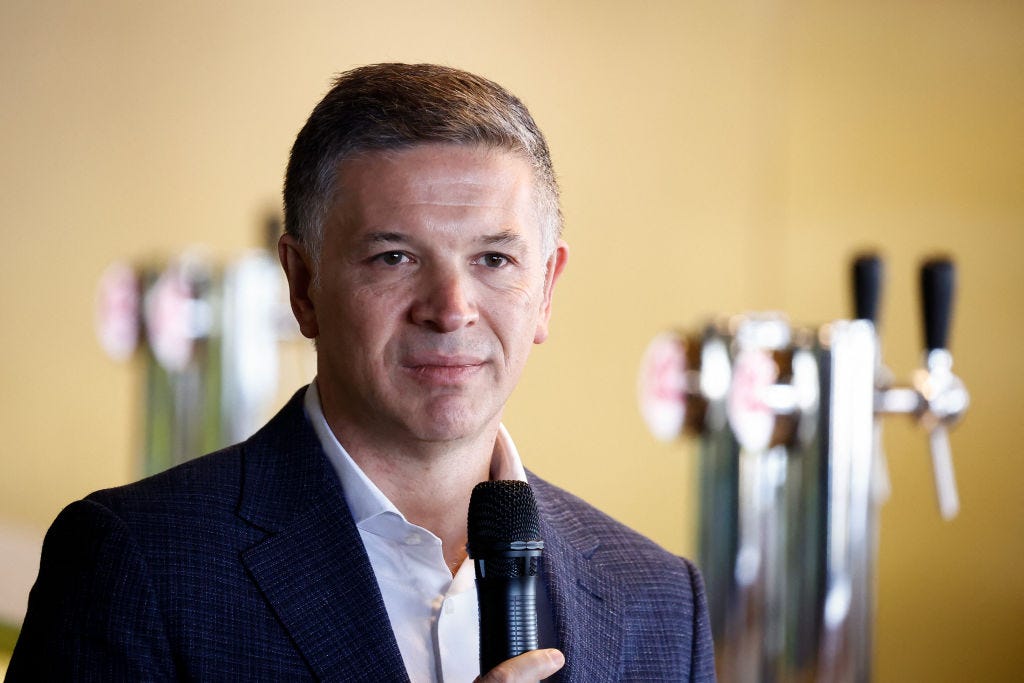
The Free Press

For most of the 11 years Anson Frericks was a top executive at Anheuser-Busch InBev, its biggest brand, Bud Light, was America’s best-selling beer. Its marketing was aimed at guys who, no matter their politics, just wanted a cold beer and a good time. But like many companies, AB InBev changed in the wake of George Floyd’s death and the start of the pandemic. In a word, the company became “woke,” emphasizing diversity, equity, and inclusion (DEI) and other social goals over profits and sales.
The culmination of this shift took place April 1, 2023, when it launched a social media campaign starring transgender activist Dylan Mulvaney. The customer boycott that followed cost Bud Light its spot as the country’s most popular beer, a position it may never regain. As an AB InBev exec, Frericks had an insider’s knowledge of the debacle that unfolded. Here, in an excerpt from his new book, Last Call for Bud Light: The Fall and Future of America’s Favorite Beer, he offers a cautionary tale of putting politics before profits.
As you enjoy the Super Bowl on Sunday, pay special attention to one of the 30-second ads that will be airing during the time-outs.
The ad, which features Shane Gillis, Post Malone, and NFL great Peyton Manning having fun at a wild barbecue, fueled by bright-blue cans of Bud Light beer, is no ordinary TV commercial. With its almost cartoonish celebration of masculine excess, the spot communicates two conventional beer-commercial messages: Bud Light is fun, and Bud Light is for guys. What makes it notable, though, is a third point, one it communicates only by implication: Bud Light is really, really sorry.
Bud Light is still trying to make up with the customer base it alienated on April 1, 2023. On that day, a brand that had been the top-selling beer in America for over two decades launched a social media campaign that would rock its customers, and not in a good way. Starring a transgender activist, Dylan Mulvaney, it celebrated Mulvaney’s first year of “girlhood.” Bud Light even sent Mulvaney a personalized can to mark this milestone date in Mulvaney’s transition from biological male to transgender woman, which millions had already followed on Instagram and TikTok.
This was not an April Fools’ Day prank as some believed, but a serious effort by the world’s largest beer company, Anheuser-Busch InBev, to “rebrand” its product.
For Bud Light, the consequences were no laughing matter. Consumers immediately recoiled and targeted the beer with one of the largest boycotts in recent history. Bud Light sales declined 11 percent that week compared to the previous year. By April 15, 2023, sales were down 21 percent. In the ensuing months, the company shed billions of dollars of shareholder value, laid off hundreds of employees across the Anheuser-Busch ecosystem, damaged its reputation, and plunked itself in the middle of a highly contentious political issue. Almost every Anheuser-Busch stakeholder—wholesalers, employees, customers, and shareholders—lost trust in the company.
Data would later confirm that, although conservatives were most outspoken about the Mulvaney campaign—Kid Rock posted a video of himself shooting cases of Bud Light with a rifle—millions of consumers from across the political spectrum were offended by it, too. Nearly two years later, Bud Light has yet to win beer lovers back; sales remain roughly 40 percent below where they were before the boycott began. Some analysts say the beer might never recover.
What went wrong at Bud Light? As the former president of the Anheuser-Busch Sales and Distribution Company—and an 11-year veteran of the company—I can tell you, this was no isolated mistake. It was the culmination of years during which Anheuser-Busch InBev, having failed to deliver new products, catchy campaigns, or fresh ideas, turned to what amounted to corporate progressivism, with an emphasis on what’s called ESG—environmental, social, and governance policies favored by the left. The stock price became secondary.
The full-scale implementation of ESG and DEI policies began at AB InBev after the start of the Covid pandemic, in 2021. In May of that year, AB InBev announced the Brazilian-born Michel Doukeris as its next CEO. The press release called him “uniquely suited to accelerate AB InBev’s transformation and lead its next chapter of growth.” The announcement further declared that during his time as president of AB North America, “the U.S. business has delivered consistent topline growth and led the beer industry in innovations for the last two years.”
That upbeat bio glossed over warning signs. AB InBev’s two biggest competitors—Constellation Brands, owner of Grupo Modelo and Corona, and Boston Beer Company, maker of Sam Adams—had grown U.S. revenue even faster than Doukeris had over the same period. As for leading the beer industry “in innovations for the last two years,” that, too, was debatable. Pasteurized bottles in the 1870s were a beer innovation, as were refrigerated railcars. Figuring out how to brew hard seltzer and package it in a Bud Light wrapper, as Doukeris did, was not. And while AB InBev may have led the industry in new product launches, those launches saw little success. Meanwhile, core brands such as Budweiser and Bud Light stagnated.

Wholesalers fretted. Anheuser-Busch’s board didn’t seem to care. Doukeris had worked at the company for decades. He had a global mindset. And he was committed to taking Anheuser-Busch’s ESG efforts to the next level, which the directors all seemed on board with. At an investor meeting in late 2021, he outlined four new goals. The first three were to lead and grow the beer category, to digitize the business, and to focus on global brands to drive down the debt versus profit ratio. Typical corporate stuff. The fourth priority? ESG.
Prior to 2021, ESG had never been a focus at investor summits, which took place every two years, and traditionally centered on how AB InBev planned to deliver strong financial returns. Doukeris’s 2021 summit, however, devoted an entire section to ESG. Most of the presentation was about environmentally friendly cost-reduction activities the company had done for years—using less water to brew beer, reducing energy consumption, using less packaging material, and so on. But now, in ramping up its ESG agenda, AB InBev also included “diversity and inclusion” initiatives.
In 2022, Doukeris appeared on Fortune’s podcast, Leadership Next, with the magazine’s then-CEO, Alan Murray. The host asked Doukeris about a lapel pin he was wearing. It was a United Nations pin, adorned with 17 colors, one for each of the UN’s sustainable development goals (SDG). Doukeris mentioned that AB InBev worked closely with the United Nations on the company’s own development goals, and it was “trying to really understand what is the role that we play in society.”
Murray was intrigued, asking to hear “a little more on why you do this. I mean, Milton Friedman said the social responsibility of business is to make a profit. Why the focus on UN ESG goals, SDG goals; why is that so important to AB InBev?”
Doukeris’s response was telling: “Of course, profit is one of the goals of the company, and that’s why companies exist—to deploy capital and to be able to compensate the shareholders [by] having returns on the capital that you deploy. But our role goes far beyond that.” He went on to explain how ESG is integrated into executive compensation and how “financial goals, commercial goals, ESG goals, they need to be aligned for us to deliver on the purpose and overall goals of the company.”
Murray followed up. “So you spend a lot of time in the United States. You have some familiarity with our political system. What do you think when you hear the governor of Florida or the governor of Texas basically say that ESG is a dirty word, and people embracing it. . . are woke CEOs? I mean, are you a woke CEO?”
“I don’t think so, but it is to be judged,” Doukeris answered.
And judged it would be.
The word woke gets thrown around a lot. I don’t particularly like it because it is not well-defined and means different things to different people. In the business sense, I define woke as a view that businesses and brands should support liberal causes, even when those causes have nothing to do with what the company does. “Woke CEOs” use their position to advance a progressive political ideology unrelated to their corporate role. Software CEOs who call to defund the police, airline CEOs who insist that election integrity laws be overturned, and finance CEOs who lament the overturning of Roe v. Wade are all “woke.”
And by that definition, Anheuser-Busch was becoming decidedly more woke. The annual ESG reports were growing longer. The principles of the company began to change. Meritocracy was out. “Diversity” was in. The shift was most obvious in how employees were assessed and promoted.
Each year, Anheuser-Busch conducted an exercise called OPR (Organizational People Review). Every employee was given a rating: mover, expected, new, or underperformer. Managers were expected to grade on a curve, with approximately 20 percent of their team rated as movers (the highest rating), 70 percent of the team performing as expected (or too new to grade), and 10 percent underperforming. Movers could expect to be promoted in the next year. Underperformers could expect a performance improvement plan (PIP). If they did not complete the PIP, they’d be fired.
OPR was a real meritocracy. Ratings were based on reviews conducted by an employee’s direct reports and on interviews with peers and managers. Managers then discussed ratings with other managers to reach a consensus. The human resources team facilitated OPR to make sure that it was done fairly and consistently across organizations. Feedback was given swiftly to all employees. Stars rose rapidly through the organization. Laggards didn’t last long.
In 2021, the company introduced “diversity dashboards.” These dashboards showed the race and gender makeup of each team. They were initially supposed to be used for “informational purposes” only, but they were soon used to judge managers whose teams were not “diverse” enough. Diversity meant race and gender. Diversity of thought wasn’t even on the dashboard. Having a “diverse” team soon became an unwritten prerequisite to receive a mover rating.
The company also instituted an annual engagement survey. It asked a variety of questions about employee happiness and satisfaction. All fine enough. But under Doukeris’s leadership, there was one question only that really mattered: how happy everyone was with DEI. The question was really asking: Are we doing enough to promote the DEI agenda? And the CEO desperately wanted the answer to be “yes.” Some departments, like HR, were even given targets to increase the number of employees who were “satisfied” with the company’s DEI efforts.
The pivot to wokeness was not driven by pure conviction. Anheuser-Busch did it in no small part to curry favor with some of the largest institutional investors on Wall Street, led by BlackRock, that were pushing companies to achieve DEI goals. If companies satisfied these investors, they could be included in ESG-focused mutual funds and more people would buy their stock, theoretically pushing up the price.
One of DEI’s chief proponents was Alissa Heinerscheid, whom Doukeris had promoted to vice president of marketing. Heinerscheid replaced Andy Goeler, who had retired at the end of 2022 after a 40-year career with Anheuser-Busch. He was a marketing genius with a long and storied history at the company.
I had worked with Alissa on numerous projects over the years. Early in her career, she led sports and music events for Bud Light. We partnered on a dive bar tour in Colorado when I was based there. She wasn’t the most creative marketer I’d worked with, and definitely not the typical Bud Light drinker, but dependable when managing budgets and executing events.
Alissa had never made a secret of her progressive politics. But despite (or perhaps because of) her far-left outlook, she was promoted to lead marketing for Bud Light—the world’s largest beer brand at the time. Article after article touted her as the “first woman” to lead the brand, as did her own LinkedIn profile. (Heinerscheid did not respond to a text asking for comment.)
It was the dawn of a new era, and impossible to miss.
The changes came rapidly. In June 2022, Anheuser-Busch gave up its exclusive rights to advertise alcohol during the Super Bowl—a pole position it had held on to tenaciously for 33 years. Competitors pounced; Heinerscheid defended the move as part of a broader “rebalancing” of the company’s ad budget. But if Bud Light lacked the money for Super Bowl exclusivity, it found money for a new partnership with the National LGBT Chamber of Commerce, donating $200,000 to its Communities of Color Initiative.
The year 2022 marked the fortieth birthday of Bud Light. One might say it was having a midlife crisis. It was trying to reinvent itself rather than sticking to what made it successful.
In a podcast appearance, Alissa said that “Bud Light had been kind of a brand of fratty, kind of out-of-touch humor, and it was really important that we had another approach.” The “inclusive” approach.
Even if this approach didn’t turn around the brand, Anheuser-Busch could at least publish in its annual ESG reports what it was doing to be more diverse, equitable, and inclusive. It could highlight its top scores in Bloomberg’s Gender-Equality Index and Human Rights Campaign Foundation’s Corporate Equality Index. It could talk about its “public commitments to the LGBTQ+” community. When it missed analyst earnings forecasts, leadership could wax eloquently about inclusive marketing to make sure the stock was included in ESG funds, bolstering the price.
This approach would have been unthinkable when I first joined Anheuser-Busch InBev in 2011. Under Carlos Brito, the previous CEO, the company was fanatical about shareholder value. They held individuals responsible for missing financial targets. Now, leadership doubled down on protecting the company’s share price through ESG as they desperately appealed to audiences they thought represented the future.
On April 1, 2023, the ESG bubble popped. And Anheuser-Busch was caught holding the pin.
The reaction to the company’s partnership with transgender biological male Dylan Mulvaney was the culmination of America’s growing frustration with corporations shoving progressive politics down customers’ throats. The transgender issue was a hot topic. And a divisive one. Did most Americans care how people dressed or identified? No. But sex-change surgeries for kids were a different matter. Sixteen states had recently passed laws regulating the practice. Twenty-five states had banned biological males from competing against biological women in K–12 sports. The country was utterly divided over the issue. And to make matters worse, the day before the campaign launched, news broke that the perpetrator of a school shooting the week before in Nashville, Tennessee, was transgender. Bud Light’s partnership with Mulvaney could not have come at a worse time.
Nothing about the Mulvaney partnership made sense. Bud Light’s generic appeal was its stock-in-trade. Its advertising had long been aimed at dedicated sports fans. Yet in the spot for Bud Light, Mulvaney is dressed in an Audrey Hepburn outfit, and says, about college basketball’s March Madness championship, “I thought we were all just having a hectic month, but it turns out it has something to do with sports.”
To say that using Mulvaney to pitch Bud Light was a debacle hardly gives it justice. In an instant, Bud Light lost its easygoing persona, sacrificed on the altar of progressive politics. And as of this Super Bowl Sunday, Bud Light has still not recovered that precious apolitical status, despite millions spent on new marketing campaigns designed to somehow bring it back. Millions of Americans just didn’t want their choice in beer to be political—not pro-trans, not anti-trans, not any-trans. Doukeris acknowledged this in the company’s May 2023 earnings call: “The beer itself should not be the focus of the debate.” That was almost two years ago, but it was already far too late.
Epilogue: Michel Doukeris still runs Anheuser-Busch InBev. Bud Light has slipped to the third best-selling beer in America, trailing Modelo and Michelob Ultra. On March 31, 2023, the day before the Mulvaney campaign launched, AB InBev stock was $66 per share with a market capitalization of $132 billion. Today, the stock price is $49 a share with a market cap of $87 billion, a loss of over $40 billion in value. Alissa Heinerscheid was placed on leave in April 2023. According to her LinkedIn profile, she now works with LIV Golf, the professional golf league underwritten by Saudi Arabia.
This article is adapted from Last Call for Bud Light: The Fall and Future of America's Favorite Beer by Anson Frericks, published by Threshold Editions.






